
ZANU PF factional fights turned nastier at the weekend, with Higher Education minister Jonathan Moyo publicly taunting President Robert Mugabe’s spokesperson, George Charamba, over his reported ill health.
By Everson Mushava/Obey Manayiti
Moyo was responding to rants by State media columnist, Nathaniel Manheru — outed to be Charamba — who accused G40 “successionists” of invoking Gukurahundi and Mthwakazi politics, as “fallback politics, should the succession issue escalate beyond its present levels”.
The column was widely seen as targeted at Moyo, who has claimed to being tribally targeted in the Zanu PF succession wars.
A Twitter user asked Moyo for his response to the column and in a hard-hitting response, the Higher Education minister, ironically, said he would not respond to the columnist, because this could cause a relapse in his illness.
“It is known he is unwell and his battle is a seesaw. I want him to fully recover and not relapse. He has my best wishes and my prayers 100%,” he said in the loaded response.
In the Saturday column, known for its hate speech, Manheru accused “big mouths” in Zanu PF of emulating Mthwakazi politics.
“Big mouths inside Zanu PF itself are borrowing arguments from Mthwakazi, lisping the divisive vocabulary that reopens old wounds that inflames passions of secession. Apart from succession, the tone of factionalism is assuming undertones of secession. Succession, secession, the twin evils,” he wrote.
- Chamisa under fire over US$120K donation
- Mavhunga puts DeMbare into Chibuku quarterfinals
- Pension funds bet on Cabora Bassa oilfields
- Councils defy govt fire tender directive
Keep Reading
Both Gukurahundi and Mthwakazi politics are being dangled as fallback politics should the succession issue escalate beyond its present levels or take a turn that is not favourable to some of these characters. Succession, thus, will lead to secession.
“For the first time after peaceful years, there is a real threat to national unity and national cohesion.” The two have often been at each other’s throats, with their feud playing out in the public media.
At one point, Charamba warned Moyo of “one bloody afternoon” when he would be sent packing out of Zanu PF and government.
Moyo, who used to be Charamba’s boss at the Information ministry, however, fired back, accusing his former subordinate of conniving with Vice-President Emmerson Mnangagwa to topple President Robert Mugabe.
Efforts to get a comment from the two were fruitless yesterday.
Meanwhile, Youth and Indigenisation minister Patrick Zhuwao yesterday accused some sections of the State media of pursuing a Zanu PF factional agenda to destabilise government operations.
Zhuwao accused State media of trying to muzzle him and other senior Zanu PF officials against freely expressing their views.
“The Sunday Mail’s editorial is quite telling. It has provided evidence to some of the analysis I personally held of the Zimpapers stable,” he said.
Zhuwao said it was wrong for the paper to support expelled war veterans’ leader, Christopher Mutsvangwa against serving senior party members.
“Zimpapers is not the Zanu PF central committee or politburo. They themselves are not Zanu PF,” he said.
“What does it say as a media entity that has taken a stance to support someone, who has come out openly attacking the President? They want to muzzle some of us who don’t support the anti-President Mugabe succession politics.”
Moyo and Local Government minister Saviour Kasukuwere have since separately sued Zimpapers for defamation following a series of negative stories targeting them.
A Zanu PF faction known as G40 is accused of taking to social media to denigrate other party members, but Zhuwao said they had been blocked out of State media and their only recourse was online platforms.











